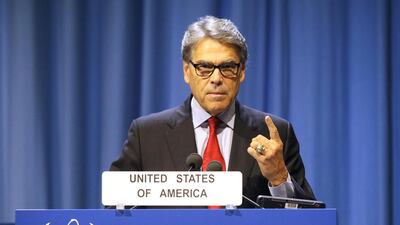Iran has come under fire from a succession of states addressing the general conference of the International Atomic Energy Agency over its nuclear violations amid calls for the international community to adopt a robust stance against Tehran’s activities.
Saudi Arabia, which on September 14 was hit by a drone and missile attack that took out half of its oil production, was unequivocal in its condemnation of Iran.
“The Kingdom of Saudi Arabia is deeply concerned about the recent developments in the Iranian nuclear program, particularly Iran’s persistent violations against its nuclear-related commitment,” head of delegation Dr Khalid Ibrahim Al Jindan
“We call upon the international community to confront such violations, and to adopt a more robust and tough stance towards Iran. This is particularly necessary in the light of Iran’s long track record of violating its international commitments and offering continued support to terrorist groups and militias and providing them with strategic weapon systems and means of delivery,” he added.
Speaking on Monday just two days after the attack on Saudi oil facilities, the United States Secretary of Energy Rick Perry addressed the strikes from Iran directly.
“The United States wholeheartedly condemns Iran’s attacks on the Kingdom of Saudi Arabia….and we call on other nations to do the same. This behaviour is unacceptable… it’s unacceptable and they must be held responsible.” Mr Perry said.
On the issue of Iran’s nuclear ambitions, he reminded the IAEA that President Donald Trump had called for the international community to keep up pressure on Iran.
“Let’s rededicate ourselves to stopping the spread of nuclear weapons everywhere including to Iran. Together we must insist that Tehran abandon its nuclear ambitions and end its malign behaviour. Iran must fully cooperate with the IAEA and we must maintain our resolve,” he said.
The UAE’s representative to the Vienna-based body Hamad Al Kaabi said Iran needed to recommit itself to the landmark 2015 deal known as the Joint Comprehensive Plan of Action, that sought to curb Tehran’s nuclear prowess.
“My country calls on Iran to honour its obligations under the IAEA safeguards.” Mr Al Kaabi said. “We hope the current situation in respect to the JCPOA offers an opportunity to the international community to devise a new approach towards addressing concerns and threats of Iran’s nuclear and regional activities,” he added.
The IAEA, the United Nation’s nuclear energy watchdog, is grappling with Iran’s decision to renege on the 2015 JCPOA. The US’s withdrawal from the agreement whereby Tehran agreed to give up its nuclear ambitions in exchange for relief on economic sanctions lies at the heart of escalating regional tensions.
The United States quit the deal saying Iran was failing to live up to the spirit of the agreement by carrying out ballistic missile tests and backing proxies in a number of regional conflicts.
Earlier this month Iran’s atomic energy agency announced that it would be deliberately violating more limits on nuclear technology and the production of nuclear material, as they were set out under the JCPOA. In July 2019 It first exceeded the amount of enriched uranium in its stockpile according to IAEA inspectors.
It was the third time Iran had announced steps to break the terms of the 2015 agreement which was hammered out in Vienna with the P5+1: China, France, Russia, the United Kingdom, and the United States plus Germany.
The announcement coincided with a September 2019 meeting between IAEA heads and Iran which was reported to the agency’s board of governors.
For its part, Iran said at the IAEA that it had been forced into the violations. “There was no option for Iran other than resorting to the relevant provisions of the JCPOA to cease partially its commitments in order to provide a new window for diplomacy to preserve the deal,” Dr Ali Akbar Salehi, the head of the country’s atomic energy organisation, said.
“It should be noted that Iran’s partial cessation of its commitments is reversible in case of full and effective implementation of the JCPOA by the remaining parties to the deal,” he added.

